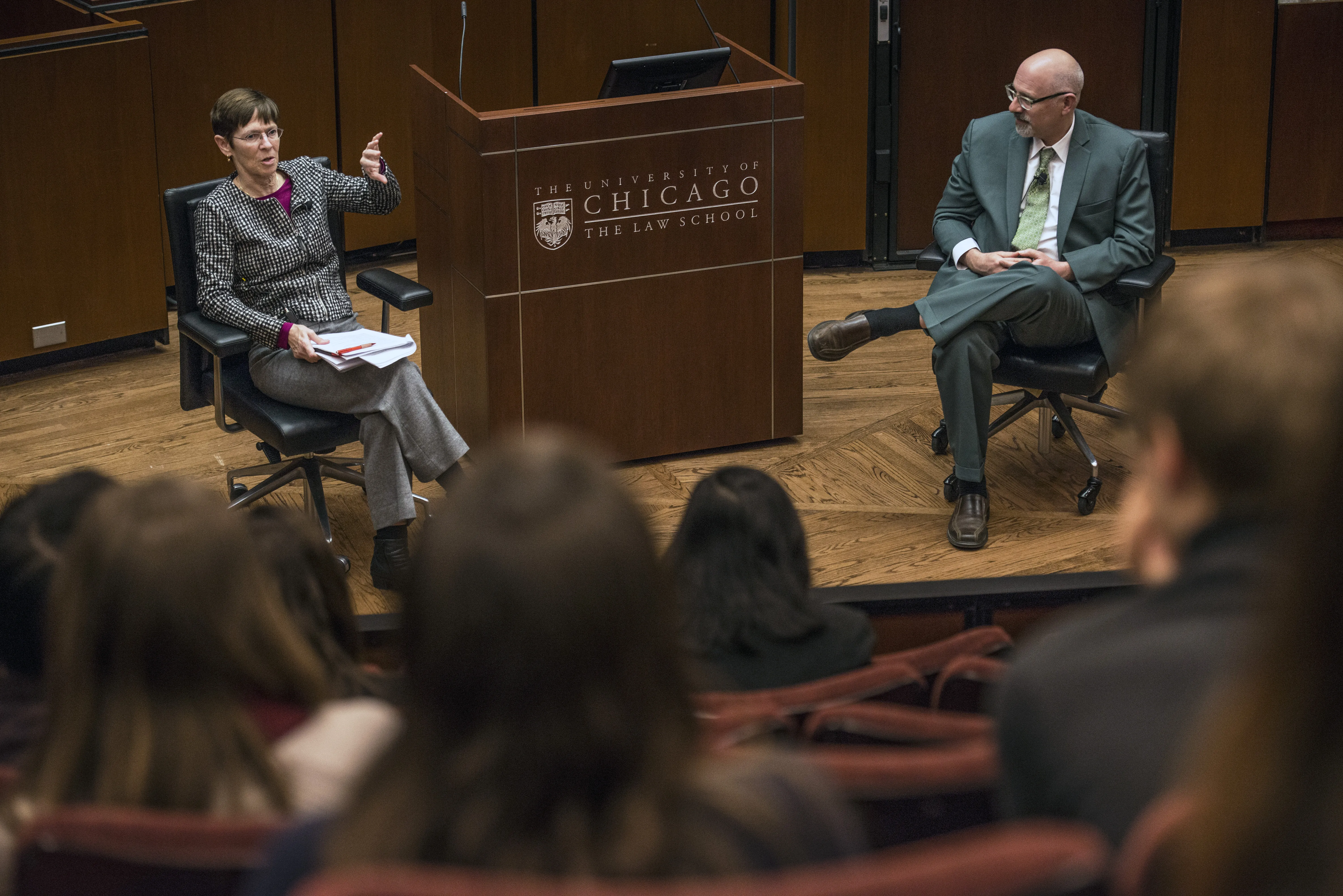Diversity, Collaboration, and Guiding Principles on the World Court

When Judge Joan Donoghue left the US State Department eight years ago to become one of 15 judges on the International Court of Justice, she had extensive experience working with lawyers from across the globe. Shifting to a judicial setting, however, she was surprised to see the extent to which the judges’ respective legal traditions—in particular, the common law and civil law traditions—influenced their approaches.
“No case that you get is easy,” Donoghue told Law School students at an event last month. “And as a judge, there’s no boss. So the fundamental question for me, which surely exists for judges in domestic contexts as well, is ‘What is your guiding principle?’”
During Donoghue’s talk, presented by the Law School’s International Program and the International Law Society, students gained a behind-the-scenes perspective on the ICJ. Commonly referred to as the World Court, the ICJ was established in 1945 and acts as the principal judicial organ of the United Nations by settling legal disputes between nations and providing advisory opinions to UN agencies. Donoghue spoke in conversation with Tom Ginsburg, Leo Spitz Professor of International Law and Ludwig and Hilde Wolf Research Scholar, and covered topics ranging from the importance of diversity on the bench, to the nature of drafting joint opinions, to the types of cases she has heard since she joined the Court.
“This was an amazing opportunity for students to get ‘under the hood’ of the World Court,” Ginsburg said. “Judge Donoghue is not only one of the top international lawyers in the world but an extraordinarily thoughtful person who was able to humanize the process of judging for the audience.”
In one of the cases Donoghue discussed, Belgium v. Senegal, Belgium brought a case to the ICJ submitting that Senegal was in violation of the United Nations Convention against torture, which requires nation-states to prosecute or extradite any person in their territory believed to have engaged in torture. The former president of Chad, Hissène Habré, was residing in Senegal at the time, and was alleged to have tortured and killed people during his reign.
“We found in favor of Belgium, and interesting things happened after that,” Donoghue said. “Senegal worked with the African Union to set up an African Chamber. The funding came from various sources, including NGOs, the African Union, and the United States. Mr. Habré was eventually prosecuted in that Chamber and convicted to a life sentence.”
Each judge on the ICJ originates from a different country, and some judges, like Donoghue, had careers as foreign ministry legal advisors before joining the Court. Others worked in academia, she said, or served on national or international regional courts, such as the International Criminal Tribunal for the former Yugoslavia.
“We are selected for our national and regional diversity, but I actually believe that this kind of professional diversity is just as important,” Donoghue said. “Age diversity is important. I mentioned that we have a lot of environmental cases—I’ve taught international environmental law, and I don’t think it even existed as a class when I was in law school, and certainly international criminal law didn’t.”
One student asked how judges handle conflicts of interest, particularly when cases involve their own countries. Donoghue explained that ad hoc judges may be added to the bench in certain cases—for instance, if Nicaragua brought a case against Costa Rica, and Costa Rica did not have a judge of its nationality on the court, the country could nominate an ad hoc judge in order to quell any perception of imbalance.
“Interestingly, ad hoc judges are frequently not of the nationality of the state that names them to sit on the Court,” Donoghue said. “The states are sophisticated, and they often will instead name a judge who they believe will be influential within the Court.”
When asked whether judges on the Court take potential compliance into account when making decisions, Donoghue said the substance of a decision would not change in order to achieve compliance, which she believes is generally good. The judges might, however, mitigate potential compliance issues with slight changes in language as they draft their opinions.
“I think there is consideration, but it has more to do with subtleties of wording as opposed to outcome,” Donoghue said. “In the reasoning, we try to be especially attentive to making sure that the party that’s been disappointed can see why we understood its arguments, but also why we weren’t convinced.”
The Court’s process, Donoghue added, follows aspects of both the common law and the civil law traditions. As in the civil law system, the ICJ’s decisions bind the parties, but do not formally create new law. At the same time, similar to the common law tradition in the United States, judges file separate and dissenting opinions, and the public can see how each judge votes. Once they have shared their preliminary views on a particular case, all 15 judges elect two members of the Court to work with the ICJ president on the drafting committee. The process, Donoghue said, requires time, collaboration, and immense attention to detail.
“This is a job for a patient person,” Donoghue said. “The ICJ’s nickname is the World Court, and I often say that there’s a tension between the court part and the world part. If you want to design a mechanism for efficient resolution of disputes between states, you would not say ‘let’s pick 15 people from 15 different countries, let’s work in two languages—we work in English and French—and let’s do everything very collaboratively,’ but that is actually what we do.”
